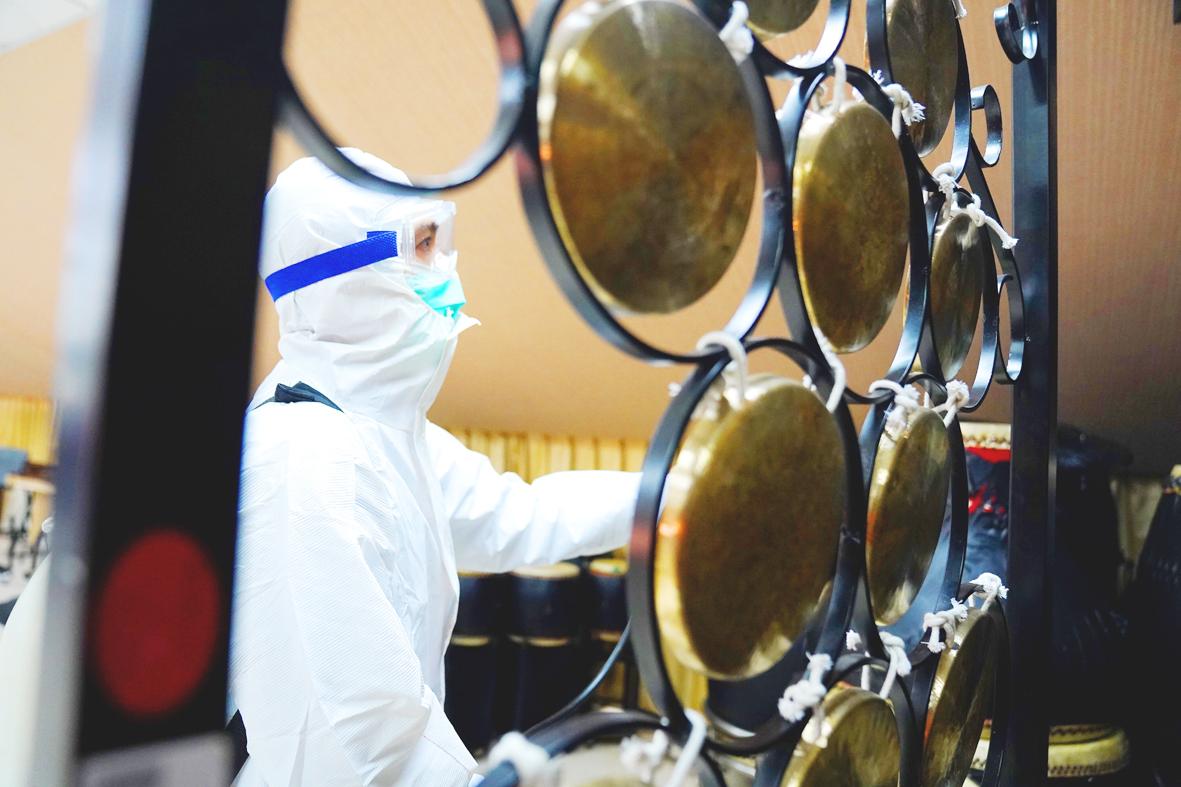At least nine of the nation’s universities have tightened campus access to prevent the spread of COVID-19.
They allow only faculty, administrative staff, students and visitors with permits to enter their campuses, university officials said.
The universities are: National Taiwan University, National Taiwan Normal University, National Chengchi University, Chinese Culture University, National Taipei University and Shih Hsin University in Taipei; Fu Jen Catholic University and Tamkang University in New Taipei City; and Yuan Ze University in Taoyuan.

Photo courtesy of Chinese Culture University
Separately yesterday, lawmakers called on the Ministry of Education to supervise schools more robustly to ensure that students have adequate e-learning resources after a number of high-school and university students were confirmed to have been infected.
Eighteen percent of students below high-school level in Kaohsiung have no Internet access, and the ratio is 15 percent in Taoyuan, Chinese Nationalist Party (KMT) Legislator Lin Yi-hua (林奕華) said during a question-and-answer session at the legislature’s Education and Culture Committee.
In areas outside the six special municipalities, 28 percent of students below high-school level in Taitung County have no Internet access, 27 percent in Chiayi County, 18 percent in Pingtung County and 17 percent in Hualien County, Lin said, citing a ministry report.
“I was extremely shocked when I saw the numbers,” she said.
K-12 Education Administration Director-General Peng Fu-yuan (彭富源) said that 32,000 15-day prepaid cards with Internet access have been prepared for economically disadvantaged students in a collaboration between the ministry and the nation’s five telecoms.
The ministry is also investigating the number of mobile devices available for people who need access to remote learning, Peng said, adding that as of yesterday, the ministry and education bureaus nationwide could offer offer 76,000 tablet computers.

South Korean K-pop girl group Blackpink are to make Kaohsiung the first stop on their Asia tour when they perform at Kaohsiung National Stadium on Oct. 18 and 19, the event organizer said yesterday. The upcoming performances will also make Blackpink the first girl group ever to perform twice at the stadium. It will be the group’s third visit to Taiwan to stage a concert. The last time Blackpink held a concert in the city was in March 2023. Their first concert in Taiwan was on March 3, 2019, at NTSU Arena (Linkou Arena). The group’s 2022-2023 “Born Pink” tour set a

The Taiwan High Court yesterday upheld a lower court’s decision that ruled in favor of former president Tsai Ing-wen (蔡英文) regarding the legitimacy of her doctoral degree. The issue surrounding Tsai’s academic credentials was raised by former political talk show host Dennis Peng (彭文正) in a Facebook post in June 2019, when Tsai was seeking re-election. Peng has repeatedly accused Tsai of never completing her doctoral dissertation to get a doctoral degree in law from the London School of Economics and Political Science (LSE) in 1984. He subsequently filed a declaratory action charging that

The Hualien Branch of the High Court today sentenced the main suspect in the 2021 fatal derailment of the Taroko Express to 12 years and six months in jail in the second trial of the suspect for his role in Taiwan’s deadliest train crash. Lee Yi-hsiang (李義祥), the driver of a crane truck that fell onto the tracks and which the the Taiwan Railways Administration's (TRA) train crashed into in an accident that killed 49 people and injured 200, was sentenced to seven years and 10 months in the first trial by the Hualien District Court in 2022. Hoa Van Hao, a

The Sports Administration yesterday demanded an apology from the national table tennis association for barring 17-year-old Yeh Yi-tian (葉伊恬) from competing in the upcoming World Table Tennis (WTT) United States Smash tournament in Las Vegas this July. The sports agency said in a statement that the Chinese Taipei Table Tennis Association (CTTTA) must explain to the public why it withdrew Yeh from the WTT tournament in Las Vegas. The sports agency said it contacted the association to express its disapproval of the decision-making process after receiving a complaint from Yeh’s coach, Chuang